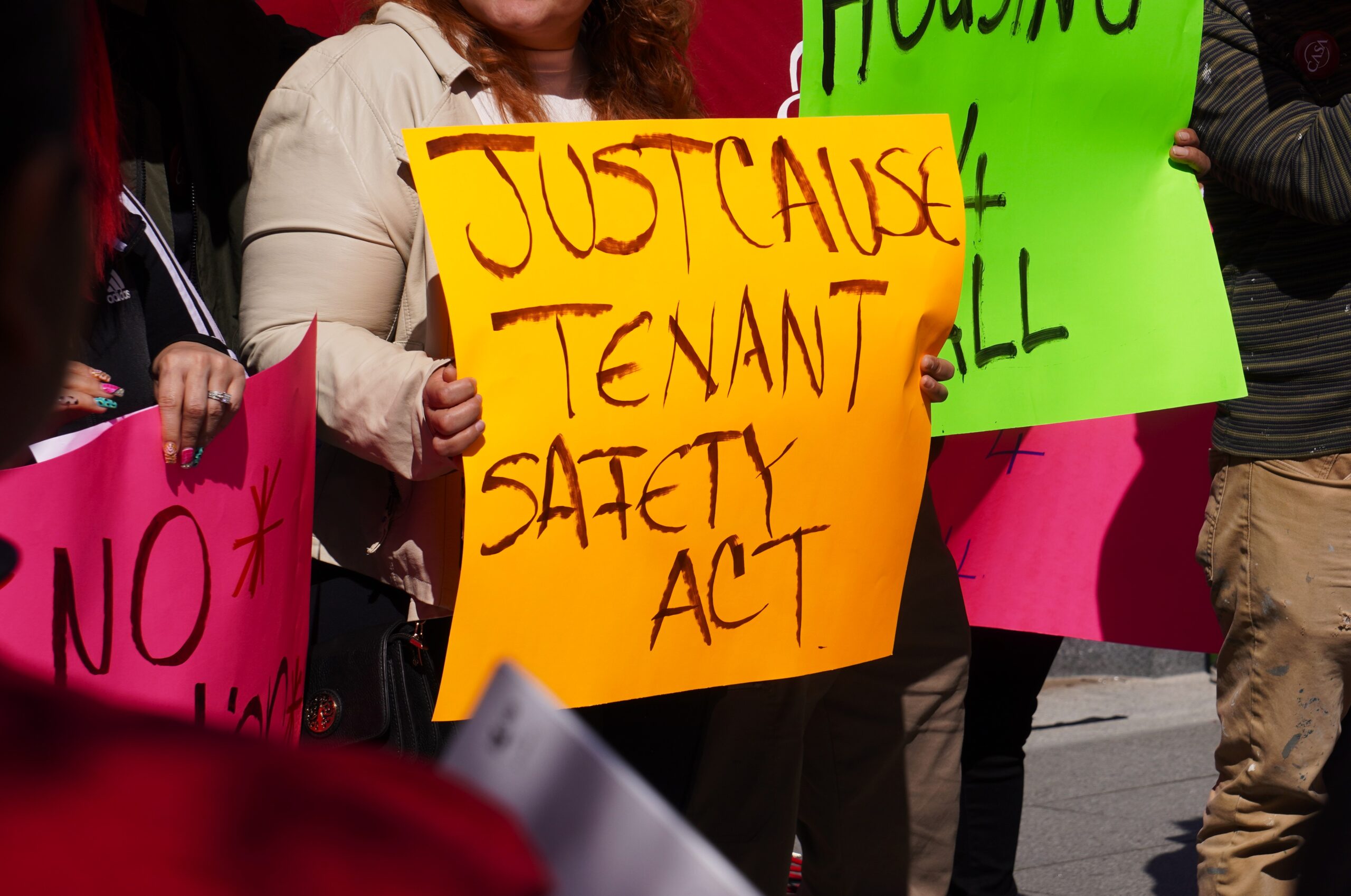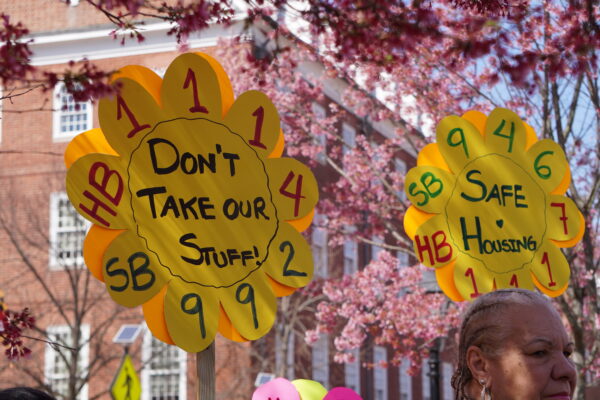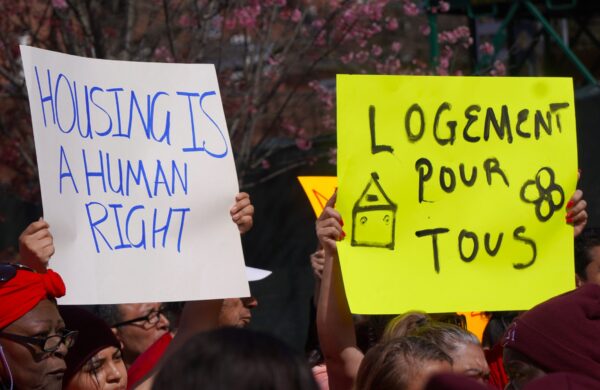Housing has been a priority this session for Moore and some lawmakers. How many bills will get through?

As the General Assembly scrambles to process bills in the waning days of Maryland’s 90-day session, renters and housing advocates are pushing for passage of measures that would ease the burden of housing insecurity across the state.
Gov. Wes Moore (D) has offered his own legislative package to address Maryland’s housing shortage, estimated at 96,000 units statewide.
But addressing the housing shortage is complicated, and legislative solutions range from incentivizing development of new affordable housing units to protecting renters from unnecessary evictions.
While largely supporting Moore’s proposed housing legislation, affordable housing and renters’ rights advocates also have their eyes on other bills that they think will help renters and improve housing opportunities.
Evictions and stability
According to an online survey of 814 Marylanders from YouGov Blue, a Democratic political research group, about 81% of respondents believe that housing has gotten less affordable over the past few years, and 60% believe local governments are not doing enough to create affordable homeownership or rental opportunities. The poll, taken Feb. 14-28, was commissioned by the nonprofit Greater Greater Washington and had a 4.7-point margin of error.
Renters United Maryland is a coalition of nonprofits that is concerned with the housing shortage and aims to improve conditions for renters and decrease evictions.
“We want to make sure that both the House and Senate prioritize these bills, because we see more and more folks facing eviction and homelessness and really terrible conditions,” said Matt Hill, an attorney and team leader of the Human Right to Housing Project out of the Public Justice Center. The Public Justice Center is part of the Renters United Maryland coalition.
One bill that the coalition supports could make it harder for landlords to evict tenants without a reason.
House Bill 477, sponsored by Del. Jheanelle K. Wilkins (D-Montgomery), would allow local jurisdictions to adopt just cause requirements for evictions, so that landlords could not evict or refuse to renew a lease without a reason.
“It says to the landlord, ‘look, you can still non-renew a lease, you just can’t do it for a discriminatory or retaliatory reasons,'” Hill explained. “When you are non-renewing the lease, you need to provide the tenant a reason why you’re not renewing the lease.”
The House of Delegates approved the legislation Thursday, with 95 members voting to approve and 37 members opposing the bill. The Senate version of the bill, sponsored by Sen. C. Anthony Muse (D-Prince George’s), still needs a vote from the Judicial Proceedings Committee before it gets to the Senate floor.
“Good Cause has never moved as far as it’s moving right now. That’s a victory,” said Jose Coronado Flores, policy analyst and lobbyist for CASA, which advocates for Black, Latino, immigrant and undocumented communities. CASA is also part of the Renters United Maryland coalition.

Members of CASA rally in support of various housing legislation on March 14, 2024. Photo by Danielle J. Brown.
The Good Cause legislation includes a list of acceptable reasons a landlord can cite if they decide not to renew a lease. Those include a breach in the lease agreement, disorderly conduct, or illegal activity on the property. A landlord can also take back the property in order to remove it from the rental market or recover the property for use by the landlord or their family members.
In 2021, city officials in Baltimore passed similar protections for renters, though Mayor Brandon Scott (D) expressed doubts about the city’s authority to enforce the measure due to potential conflicts with state law, the Baltimore Sun reported at the time.
Renters United Maryland activists are also watching bills that would provide better protection for tenants’ possessions when facing evictions. But the legislation is still waiting on committee votes in the House and Senate.
“We haven’t seen it on any voting list. We’re a bit nervous about that,” Coronado Flores said.
Another eviction protection bill is SB 370, which would allocate $10 million to help provide rental assistance for low-income families who have children enrolled in community schools and might be facing eviction. The funds would be used to help those families pay overdue rent or utility bills when they fall on hard times.
Thursday the Senate passed that bill, sponsored by Sen. Shelly Hettleman (D-Baltimore), with only three members voting against it.
Its House companion bill still needs approval from assigned joint committees, Appropriations and Ways and Means.
Another bill, sponsored by Del. Vaughn Stewart (D-Montgomery), would make the “renters escrow” process more accessible when landlords do not adequately address life-threatening repairs, by enabling tenants to file a complaint with the local district court and put rent payments in escrow while the complaint is adjudicated.
The bill, HB 1117, is referred to as the Tenant Safety Act of 2024. The House Environment and Transportation committee approved it Thursday, but its Senate companion bill has not gotten a vote.
Sharon Littlejohn, a CASA advocate living in Montgomery County, said that she supports the Tenant Safety Act because she’s had experience living in an unsafe rental property.
“I was in an apartment for about five years, and for those five years, I suffered with flooding on the ground floor,” she said. “To a point where Red Cross had to come in and put myself and my daughter up…had to find a place for us to live until we could move back into our home.”
Littlejohn attended a CASA rally Thursday urging lawmakers to move forward on the Tenant Safety Act.
“We deserve to be safe. We deserve to live in safe housing. We deserve to live in comfortable housing, and we deserve to be heard,” she said. “What we want today is not just words. We want action.”
Moore’s housing package
The governor’s proposed housing legislative package primarily works to increase housing supply while also creating an office within his administration to help renters know their rights when they come into conflict with a landlord.
Moore’s housing package contains three bills and much of it is focused on increasing the supply of affordable units, with some protections included for renters.
Hill says that the legislative priorities of Renters United Maryland would work alongside Moore’s legislative package.
“We support the governor’s housing package,” Hill said. “We’ve testified in favor. We’ve reached out to individual lawmakers and said ‘look, these things are important as well.'”
HB 599, called the Housing and Community Development Financing Act of 2024, would create the Maryland Community Investment Corporation, a state entity that would make loans or investments aimed at developing and improving low-income communities. The organization would help secure federal funding opportunities to invest in additional development projects.
It’s set for a full floor vote as lawmakers approach crossover day, the deadline for guaranteeing that a bill passed in one house of the Assembly will be considered in the other house during the final three weeks of the legislative session.

Members of CASA rally in support of various housing legislation on March 14, 2024. Photo by Danielle J. Brown.
Meeting the crossover deadline is not essential for getting legislation passed before the legislature adjourns, especially for the governor’s priority legislation. Crossover day is Monday, March 18.
HB 538, named the Housing Expansion and Affordability Act of 2024, would allow certain development projects to exceed typical density limits if the new development incorporates a certain percentage of affordable housing units.
The goal is to incentivize new affordable housing development by permitting new properties that include affordable units to be developed with higher density and in a more expeditious manner.
One of the incentives laid out in the bill would work to encourage developers to build affordable housing options close to train stations and other transportation hubs.
“I really think it’s important to link the transportation to the fact that our communities are super polluted by traffic,” Coronado Flores of CASA said.
“If we can guarantee that fewer cars are going to be nearby, if we can incentivize or just make it easier for people to drive less, or even need a car, that’s really good for the environment and for the ambient air around our communities,” he said.
The final housing bill in the governor’s legislative package is HB 693, also known as the Renters’ Rights and Stabilization Act of 2024.
It would give tenants residing in a rental property the right of first refusal if the landowner wants to sell the property. Tenants would have an opportunity to purchase the property before a third party could buy it.
The House Environment and Transportation Committee approved the legislation Thursday, but added a few changes to the bill.
The amendments changed the name of the office that would help tenants know what protections and legal actions they have under Maryland law.
The office was originally called “Office of Tenants’ Rights,” but the Thursday amendment changed the name to the “Office of Tenants and Landlord Affairs.”
With committee approval, the legislation will be heading to the House floor soon.
HB 693 would make it harder for landlords to evict tenants during major adverse weather conditions, such as a severe heat wave, hurricanes, blizzards, and in other states of emergencies declared for public safety.
To reduce the number of unnecessary evictions, HB 693 would increase the fee that a landlord pays to issue an eviction. Moore’s legislation initially raised the fee from $8 to $93, but the Thursday amendment lowered the proposed eviction filing fee from $93 to $83.
Additional funds generated from the increased fees would go to state housing assistance and vouchers to help struggling Marylanders find housing.




 Creative Commons Attribution
Creative Commons Attribution